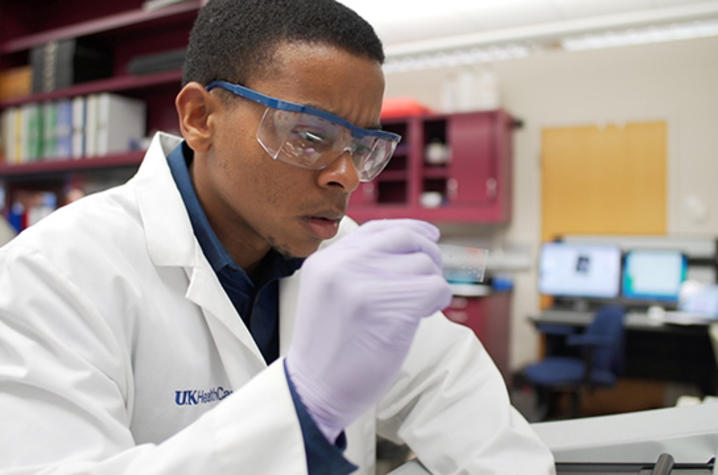Research Helps Drive Kentucky’s Economy

At the University of Kentucky, we strive to be at the intersection of innovation and impact.
We are called, as a $3.7 billion academic, research and health enterprise, to answer still lingering questions while daring to pioneer the questions yet asked.
This discovery helps drive Kentucky’s economy.
Our rare mix of top ranked programs in agriculture, engineering, medicine, and pharmacy positions UK to excel in rigorous, multidisciplinary research from the bench to the community.
And that kind of research – at the intersection of disciplines – is where discovery and solutions happen today. The diseases we fight are complex and multi-faceted. So, too, are the solutions. An institution like UK is poised in distinctive ways to engage in the battle with success.
For example, despite an increasingly competitive landscape for federal research funding, UK research is growing.
This year, faculty and staff researchers added to a growing research portfolio. They earned another $19.8 million Clinical and Translational Science Award from the National Institutes of Health. The grant helps us move discoveries in the lab to solutions at the bedside.
The Markey Cancer Center – Kentucky’s only NCI-designated cancer institute – was recently named among the top 50 cancer centers in the country by US News – a pivotal step in addressing the growing scourge of cancer in our Commonwealth.
The Institute for Bioinformatics – a collaborative research center that includes representatives from medicine and biostatistics – received a $2.8 million instrumentation grant from the National Science Foundation.
What do these grants and dollar amounts represent? Our capacity to address – at all levels and through bench, clinical, and demographic research – the diseases that afflict Kentucky families at far greater rates than the national average.
As so many of our communities unfortunately know, these diseases know no boundaries.
They aren’t limited to certain zip codes, ethnicities, or stations in life – and this community – our Commonwealth -- isn’t immune. No place is.
Take the opioid epidemic: According to one recent report, 1 million Kentuckians are directly impacted in some way by the scourge of drugs.
This disease of despair is wreaking havoc on our state, and, indeed, our country—which is why we’re working to address this issue. UK faculty – supported by more than $11 million in federal research grants – converged in Atlanta, Georgia with stakeholders from various agencies and the academy to address opioid abuse.
We have terrific partners in this fight—and in the various battles we’re facing.
Kentucky’s public universities last year received $151 million for research against our worse diseases from the National Institutes of Health.
We believe in the powerful idea that brainpower, harnessed in common cause against insidious problems, can find answers.
From basic and translational science to working directly in – and with – communities, UK’s research enterprise is engaged in the critical questions of our day.
As Kentucky’s flagship research university, we are developing a well-educated workforce for the state. We are creating more jobs through smart growth and capital investment. And we are sustaining business and industry development through our research and commercialization.
Research and workforce development yield economic development for a 21st century Kentucky economy.
And we’re not going anywhere. This institution is rooted in Kentucky. Because of this, Kentucky’s investment in us is not at risk of being recruited away by another state or city. It's why I proudly say that we are the University for Kentucky. It's why we exist. It's why we were founded more than 150 years ago. And Kentucky's future is what continues to guide us.
In the wake of the First World War, amid a tumultuous period in our history, our third UK President, Frank McVey, said that, “As the years go on, the state university will become more and more important to the people of Kentucky, because the people will need interpretations of social movements, knowledge and understanding of scientific investigation and discoveries, and the benefit of trained personnel to carry out the purposes of the state.”
In his words, he concluded that, “what will save this nation after the war are the universities.”
Each day we are, together, grappling with how we continue to fulfill this vision. We are working with a sense of common purpose at an uncommon and distinctive place to find those answers.
Today, faced with a new array of complex questions and issues, we find the university again climbing an increasingly steep mountain.
Our Commonwealth, more than ever, is depending on us to make that climb, to continue that journey, as the University for Kentucky.




